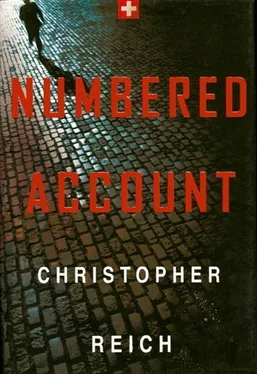“What are you talking about?”
A bemused expression played across Schweitzer’s face. “I told you I’ve been with the bank thirty-five years. Long enough to remember your father. In fact, I knew him well. We all did. And I can assure that no one on the Fourth Floor has forgotten his embarrassing behavior.”
“My father was an honorable man,” Nick said instinctively.
“Of course he was. But then again, you wouldn’t really know, would you?” Schweitzer offered a malevolent smile and walked to the door. Opening it, he said, “And Neumann? If you think I’m walking on a tightrope, perhaps you haven’t looked down lately. It’s a long fall from the Fourth Floor. I’ll be watching you.”
“Take a number!”
Schweitzer gave a curt bow and left the room.
Nick collapsed into his chair. Peter Sprecher had been right to call Schweitzer dangerous, but he had forgotten to mention paranoid, psychotic, and delusional. What the hell had Schweitzer meant about his father’s “embarrassing behavior”? What had his father done to cause the bank distress? Nick knew only the rudiments of his father’s career. Alex Neumann had started in the bank at age sixteen and worked as an apprentice for four years. His first real jobs had been as assistant and then full portfolio manager. According to Cerruti, he had worked under Kaiser in both positions. Could his father have done something to embarrass the bank then? Nick didn’t think so. Schweitzer hadn’t been referring to any lighthearted shenanigans a junior executive might have gotten up to. He’d been talking about something serious, probably something that had happened after Alex Neumann had been transferred to Los Angeles to open up USB’s branch office there.
The only clues Nick had to his father’s practices in Los Angeles were inside the two agendas he’d found in Hannibal; first there was mention of one Allen Soufi, a private banking client, whose every visit occasioned a stern afterword. One time labeled a Schlitzohr—Swiss slang for crook, another time simply “undesirable.” And later, his name underscored by the chilling reminder “Bastard threatened me,” written not in his father’s usual looping script but spelled out in bold block letters. There was more. A company named Goldluxe that he had visited, apparently in response to a demand for commercial credit, and about which he had written a frank appraisal. “Dirty.” “Impossible sales.” “Hands off.” Yet with which, if his entries were to be interpreted clearly, he had been forced to do business.
Nick brought his head forward and massaged the bridge of his nose. He asked himself how the bank could construe actions taken to protect it from unseemly business interests as embarrassing behavior? He only had to replay Thorne’s accusations about Kaiser’s long-term relationship with one Ali Mevlevi to know how. The bank wanted to do business with those unseemly interests.
Nick sat up straight in his chair. The only place he knew to look for an answer to these questions was in the monthly activity reports his father sent back from Los Angeles. To get those, he’d have to ask Cerberus to generate a request form, which would bear his initials, or find someone willing to retrieve them for him. The first path was too risky, the second closed—at least for now. He’d just have to wait and hope to find another way.
Patience, he told himself in a voice not unlike his father’s. Control yourself.
Nick had a hard time guiding his attentions back to his job. He unfolded the paper Schweitzer had been so anxious to discover and laid it on the desk. The list contained the names of those shareholders, both institutional and individual, who held significant blocks of USB stock. He smiled when he came to the name of Eberhard Senn, the Count Languenjoux. The old-timer held a block of shares worth over 250 million francs—six percent of the bank. His votes would be crucial.
There were many other names on the list. For those who kept their shares in an account at USB, Nick would request a copy of the client’s entire file. This he would study, assimilating a maximum of pertinent detail about the client, before telephoning. Needless to say, those shares of USB stock held in discretionary accounts managed by the bank would be voted in favor of reigning management.
The vast majority of USB shareholders, however, did not hold an account with the bank. In these cases, Nick would contact either the individual shareholder or more frequently, the fund manager responsible for voting the shares, and preach the bank’s doctrine of increased profitability. The names on his list were primarily American institutional investors: the New York State Teachers’ Retirement Fund, California Employees Retirement Fund, Morgan Stanley European Equity Fund.
Nick grabbed a stack of file request forms and began filling them out. Name of portfolio manager, department, date requested, signature. The paperwork left nothing to chance, nothing unclear. The only spaces missing were for his height, weight, and tipple of choice. Each request was to be signed by Kaiser prior to being forwarded to the responsible executive. Client information was treated as confidentially within the bank’s walls as it was outside of them. Nick wondered if he would ever be able to liberate his father’s monthly activity reports from Dokumentation Zentrale. Not if he needed Kaiser’s signature, he wouldn’t. Not if Schweitzer was tracking his every move within the bank.
An hour after he’d begun his monotonous travail, Nick was interrupted by Yvan, the postman. Yvan entered his office and handed him several manila envelopes, the medium of internal postage in corporations the world over. Nick signed for them. He recalled Thorne’s words, Check your mail, young man, and began tearing open the envelopes.
The first held a memorandum from Martin Maeder addressed to all portfolio managers “suggesting” that they consider upping their clients’ holding of USB common stock. Obviously, it was a tactic designed to inflate the bank’s control over its own shares. Technically, the request bordered on a violation of the sacrosanct “Chinese wall,” the invisible boundary that separated the worlds of investment and commercial banking that coexisted under the roofs of all universal Swiss banks. In the world of the managed account, where investments were made with the discretion of the portfolio manager alone, the bank had tremendous power to manipulate the prices of stocks, to ensure the successful underwriting of a bond or equity issue, or to move the value of a currency.
Nick tossed Maeder’s memo in the trash bin and opened the second envelope. Inside was a white letter inscribed only with his name and the bank’s address. No stamp was affixed, no postmark noted. He slit open the envelope. Inside was a copy of Nick’s separation papers from the United States Marine Corps and a one-page ruling from the Board of Inquiry citing the grounds for his dishonorable discharge. Felonious assault with intent to cause grievous bodily harm. Intent? Hell, he’d beaten the living tar out of Keely. He’d pummeled the fat-assed motherfucker to within an inch of his worthless life. Payback, Agent Keely, courtesy of First Lieutenant Nicholas A. Neumann USMCR.
Nick threw the papers onto his desk, at once furious and incredulous that Thorne had gotten hold of them. By law, they were to be graded top secret and kept sealed at Headquarters Marine Corps in D.C. He had told no one about his discharge, certainly not Kaiser. The official record accorded him a general discharge. He had served his country well, had done his duty. As a man, he had acted honorably. As a soldier, maybe less so. But it was no one’s business but his and Jack Keely’s.
He dropped his hand to the underside of his right thigh and massaged the unnatural indentation behind his right knee, where more than a pound of flesh and muscle was missing. Thorne and Keely. Different men, different times, but with the same agenda, the same motivation. Neither could be trusted.
Читать дальше












